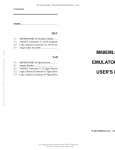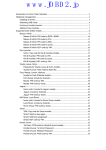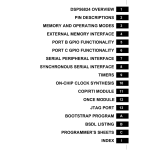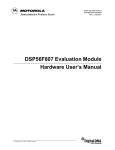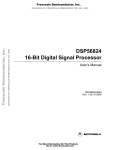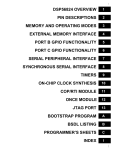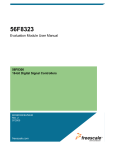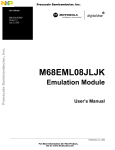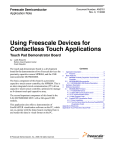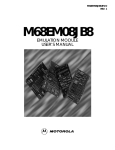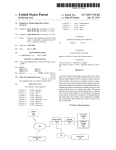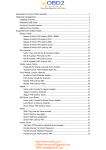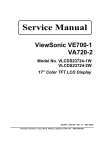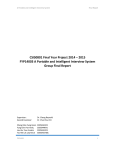Download M68EML08AB32 - NXP Semiconductors
Transcript
M68EML08AB32UM/D REV. 1 M68EML08AB32 EMULATION MODULE USER’S MANUAL User’s Manual Motorola reserves the right to make changes without further notice to any products herein to improve reliability, function or design. Motorola does not assume any liability arising out of the application or use of any product or circuit described herein; neither does it convey any license under its patent rights nor the rights of others. Motorola products are not designed, intended, or authorized for use as components in systems intended for surgical implant into the body, or other applications intended to support or sustain life, or for any other application in which the failure of the Motorola product could create a situation where personal injury or death may occur. Should Buyer purchase or use Motorola products for any such unintended or unauthorized application, Buyer shall indemnify and hold Motorola and its officers, employees, subsidiaries, affiliates, and distributors harmless against all claims, costs, damages, and expenses, and reasonable attorney fees arising out of, directly or indirectly, any claim of personal injury or death associated with such unintended or unauthorized use, even if such claim alleges that Motorola was negligent regarding the design or manufacture of the part. © Motorola, Inc., 2000; All Rights Reserved User’s Manual 2 M68EML08AB32 Emulator Module — Rev. 1 MOTOROLA User’s Manual User’s Manual 3 M68EML08AB32 Emulator Module — Rev. 1 MOTOROLA User’s Manual — M68EML08AB32 List of Sections Section 1. General Description . . . . . . . . . . . . . . . . . . . . . 9 Section 2. Configuration and Operation . . . . . . . . . . . . . 15 Section 3. Connector Information . . . . . . . . . . . . . . . . . . 19 Section 4. Schematics . . . . . . . . . . . . . . . . . . . . . . . . . . . 31 M68EML08AB32 Emulator Module — Rev. 1 MOTOROLA User’s Manual List of Sections 3 List of Sections User’s Manual 4 M68EML08AB32 Emulator Module — Rev. 1 List of Sections MOTOROLA User’s Manual — M68EML08AB32 Table of Contents Section 1. General Description 1.1 1.2 1.3 1.3.1 1.3.2 1.4 1.5 Contents . . . . . . . . . . . . . . . . . . . . . . . . . . . . . . . . . . . . . . . . . . . . . . . . 9 Introduction. . . . . . . . . . . . . . . . . . . . . . . . . . . . . . . . . . . . . . . . . . . . . . 9 Development Systems. . . . . . . . . . . . . . . . . . . . . . . . . . . . . . . . . . . . . 10 Motorola Modular Development System (MMDS). . . . . . . . . . . . 10 Motorola Modular Evaluation System (MMEVS). . . . . . . . . . . . . 11 EM Layout . . . . . . . . . . . . . . . . . . . . . . . . . . . . . . . . . . . . . . . . . . . . . 12 Specifications . . . . . . . . . . . . . . . . . . . . . . . . . . . . . . . . . . . . . . . . . . . 13 Section 2. Configuration and Operation 2.1 Contents . . . . . . . . . . . . . . . . . . . . . . . . . . . . . . . . . . . . . . . . . . . . . . . 15 2.2 Introduction. . . . . . . . . . . . . . . . . . . . . . . . . . . . . . . . . . . . . . . . . . . . . 15 2.3 Setting Jumper Headers . . . . . . . . . . . . . . . . . . . . . . . . . . . . . . . . . . . 16 2.3.1 Clock Source Header (P1) . . . . . . . . . . . . . . . . . . . . . . . . . . . . . . . 17 2.3.2 ADC Module Voltage Selector (P2 & P6). . . . . . . . . . . . . . . . . . . 17 2.4 Remaining System Installation . . . . . . . . . . . . . . . . . . . . . . . . . . . . . . 18 Section 3. Connector Information 3.1 3.2 3.3 3.4 3.5 Contents . . . . . . . . . . . . . . . . . . . . . . . . . . . . . . . . . . . . . . . . . . . . . . . 19 Introduction. . . . . . . . . . . . . . . . . . . . . . . . . . . . . . . . . . . . . . . . . . . . . 19 Logic Analyzer Connector (P4) . . . . . . . . . . . . . . . . . . . . . . . . . . . . . 20 Target Connectors (P7 and P8). . . . . . . . . . . . . . . . . . . . . . . . . . . . . . 23 Target Cable Assembly. . . . . . . . . . . . . . . . . . . . . . . . . . . . . . . . . . . . 29 Section 4. Schematics Index M68EML08AB32 Emulator Module — Rev. 1 MOTOROLA User’s Manual Table of Contents 5 Table of Contents User’s Manual 6 M68EML08AB32 Emulator Module — Rev. 1 Table of Contents MOTOROLA User’s Manual — M68EML08AB32 Lists of Figures and Tables Figure Title Page Figure 1-1. M68EM08AB32 Emulator Module . . . . . . . . . . . . . . . . . . . . . . . 12 Figure 2-1. Jumper Header P1 . . . . . . . . . . . . . . . . . . . . . . . . . . . . . . . . . . . . 17 Figure 2-2. Jumper Header P2 . . . . . . . . . . . . . . . . . . . . . . . . . . . . . . . . . . . . 17 Figure 2-3. Jumper Header P6 . . . . . . . . . . . . . . . . . . . . . . . . . . . . . . . . . . . . 18 Figure 3-1. Logic Analyzer Connector P4 Pin Assignments . . . . . . . . . . . . . 20 Figure 3-2. Target Connectors P7 and P8 Pin Assignments. . . . . . . . . . . . . . 23 Figure 3-3. Target Cable Assembly . . . . . . . . . . . . . . . . . . . . . . . . . . . . . . . . 29 Table Title Page Table 1-1. M68EM08AB32 Specifications . . . . . . . . . . . . . . . . . . . . . . . . . . 13 Table 2-1. Jumper Headers . . . . . . . . . . . . . . . . . . . . . . . . . . . . . . . . . . . . . . 16 Table 3-1. Logic Analyzer Connector P4 Signal Descriptions . . . . . . . . . . . 21 Table 3-2. Target Connectors P7 Signal Description . . . . . . . . . . . . . . . . . . . 24 Table 3-3. Target Connectors P8 Signal Descriptions . . . . . . . . . . . . . . . . . . 27 M68EML08AB32 Emulator Module — Rev. 1 MOTOROLA Lists of Figures and Tables User’s Manual 7 Lists of Figures and Tables User’s Manual 8 M68EML08AB32 Emulator Module — Rev. 1 Lists of Figures and Tables MOTOROLA User’s Manual — M68EML08AB32 Section 1. General Description 1.1 Contents 1.2 Introduction. . . . . . . . . . . . . . . . . . . . . . . . . . . . . . . . . . . . . . . . . . . . . . 9 1.3 Development Systems. . . . . . . . . . . . . . . . . . . . . . . . . . . . . . . . . . . . . 10 1.3.1 Motorola Modular Development System (MMDS). . . . . . . . . . . . 10 1.3.2 Motorola Modular Evaluation System (MMEVS). . . . . . . . . . . . . 11 1.4 EM Layout . . . . . . . . . . . . . . . . . . . . . . . . . . . . . . . . . . . . . . . . . . . . . 12 1.5 Specifications . . . . . . . . . . . . . . . . . . . . . . . . . . . . . . . . . . . . . . . . . . . 13 1.2 Introduction This user’s manual explains connection, configuration, and operation information specific to the M68EML08AB32 emulator module (AB32EM). The AB32EM lets you emulate and debug target systems based on the MC68HC08AB16A and MC68HC908AB32 microcontroller units: This section describes Motorola’s two development systems that use the AB32EM, and it explains the AB32EM’s layout. 1.3 Development Systems The AB32EM can be part of two Motorola development systems: • MMDS0508 Motorola Modular Development System (MMDS) • MMEVS0508 Motorola Modular Evaluation System (MMEVS) M68EML08AB32 Emulator Module — Rev. 1 MOTOROLA User’s Manual General Description 9 General Description 1.3.1 Motorola Modular Development System (MMDS) The MMDS is an emulator system that provides a bus state analyzer and real-time memory windows. The unit’s integrated design environment includes an editor, an assembler, user interface, and source-level debug. A complete MMDS consists of: • Station module — The metal MMDS enclosure containing the control board and the internal power supply • Emulator module (EM) — A separately purchased printed circuit board that enables system functionality for a specific set of microcontroller units • Two logic clip cable assemblies — Twisted-pair cables that connect the station module to the target system, a test fixture, a clock, an oscillator, or any other circuitry useful for evaluation or analysis. One end of each cable assembly has a molded connector, which fits into station-module pod A or pod B. Leads at the other end of each cable terminate in female probe tips. Ball clips come with the cable assemblies. • 9-lead RS-232 serial cable — Cable that connects the station module to the host computer RS-232 port • 9- to 25-pin adapter — A molded assembly that connects the 9-pin cable to a 25-pin serial port • System software — MCUez™ software on CD-ROM and P&E Microcomputer System, Inc. software on CD-ROM • MMDS documentation — MMDS Operations Manual, Motorola document order number MMDS0508OM/D; the MCUez software manual, included with the MCUez software package; a system software manual, included with the P&E Microcomputer System, Inc.’s MMDS0508 software package; and this EM user's manual (this manual) MMDS baud rates are selected by the user at 2400, 4800, 9600, 19,200, 38,400, or 57,600. As mentioned, the AB32EM gives the MMDS the ability to emulate target systems based on MC68HC08AB16A and MC68HC908AB32 microcontroller units. By substituting a different EM, MMDS can be enabled to emulate target User’s Manual 10 M68EML08AB32 Emulator Module — Rev. 1 General Description MOTOROLA General Description Development Systems systems based on a different MCU. (A local Motorola representative can explain all the EMs available.) 1.3.2 Motorola Modular Evaluation System (MMEVS) An MMEVS is an economical, two-board tool for designing, debugging, and evaluating target systems based on MC68HC05 or MC68HC08 MCUs. A complete MMEVS consists of: • Platform board (PFB) — The bottom board, which supports the emulator module; has connectors for power and for a terminal or host computer • Emulator module (EM) — A separately purchased printed circuit board that enables system functionality for a specific set of MCUs; fits onto the PFB • RS-232 serial cable — A separately purchased cable that connects the PFB to the host computer RS-232 port • System software — MCUez™ software on CD-ROM and P&E Microcomputer System, Inc. software on CD-ROM • MMEVS documentation — MMEVS Operations Manual, Motorola document order number MMEVSOM/D; the MCUez software manual, included with the MCUez software package; a system software manual, included with the P&E Microcomputer System, Inc.’s MMDS0508 software package; and this emulator user's manual An MMEVS features automatic selection of the communication baud rate from these choices: 2400, 4800, 9600, 19,200, 38,400, or 57,600. With a AB32EM, the MMEVS emulates target systems based on MC68HC908AB32 MCUs. By substituting a different EM, the MMEVS can be enabled to emulate target systems based on a different MCU. (A local Motorola representative can explain all the EMs available.) Section 2. Configuration and Operation explains how to configure and use the AB32EM as part of an MMDS or MMEVS system. M68EML08AB32 Emulator Module — Rev. 1 MOTOROLA User’s Manual General Description 11 General Description 1.4 EM Layout Figure 1-1 shows the layout of the AB32EM. Figure 1-1. M68EML08AB32 Emulator Module The main elements of the AB32EM are: • DIN connectors P3 and P5 — Connect the EM to the MMDS control board or the MMEVS platform board • Connector P4 — Permits connection to a logic analyzer • Jumper header P2 and P6 — Select the analog voltage supply for the ADC module of the MC68HC908AB32. • Jumper header P1 — Selects the MCU clock source User’s Manual 12 M68EML08AB32 Emulator Module — Rev. 1 General Description MOTOROLA General Description Specifications • Connectors P7 and P8 — Customer-specific interfaces to the target system The AB32EM requires a user-supplied 80-lead target cable and target head adapter to connect the target system to connectors P7 and P8. 1.5 Specifications Table 1-1 lists AB32EM specifications. Table 1-1. M68EML08AB32 Specifications Characteristics Specifications MCU extension I/O ports HCMOS compatible Operating temperature 0° to 40°C Storage temperature –40° to +85°C Relative humidity 0 to 90% (non-condensing) Power requirements +5 V dc and +12 V dc (charge pump), provided from the MMDS control board or MMEVS platform board Dimensions 8.2 x 5.5 inches; 207 x 140 mm Weight 7.62 ounces; 216 grams M68EML08AB32 Emulator Module — Rev. 1 MOTOROLA User’s Manual General Description 13 General Description User’s Manual 14 M68EML08AB32 Emulator Module — Rev. 1 General Description MOTOROLA User’s Manual — M68EML08AB32 Section 2. Configuration and Operation 2.1 Contents 2.2 Introduction. . . . . . . . . . . . . . . . . . . . . . . . . . . . . . . . . . . . . . . . . . . . . 15 2.3 Setting Jumper Headers . . . . . . . . . . . . . . . . . . . . . . . . . . . . . . . . . . . 16 2.3.1 Clock Source Header (P1) . . . . . . . . . . . . . . . . . . . . . . . . . . . . . . . 17 2.3.2 ADC Module Voltage Selector (P2 & P6). . . . . . . . . . . . . . . . . . . 17 2.4 Remaining System Installation . . . . . . . . . . . . . . . . . . . . . . . . . . . . . . 18 2.2 Introduction This section explains configuration and operation of the AB32EM when it is installed in an MMDS (Motorola modular development system) or MMEVS (Motorola modular evaluation system). For other parts of system installation or configuration, see the MMDS or MMEVS hardware manuals. NOTE: An AB32EM already installed in an MMDS station module can be reconfigured. To do so, switch off station-module power, then follow the guidance in this section. Similarly, AB32EM that is already installed on the MMEVS platform board can be reconfigured, provided that platform-board power is disconnected. CAUTION: Be sure to switch off or disconnect power when reconfiguring an installed EM. Reconfiguring EM jumper headers with the power on can damage system circuits. M68EML08AB32 Emulator Module — Rev. 1 MOTOROLA Configuration and Operation User’s Manual 15 Configuration and Operation ESD CAUTION: Ordinary amounts of static electricity from clothing or the work environment can damage or degrade electronic devices and equipment. For example, the electronic components installed on printed circuit boards are extremely sensitive to electrostatic discharge (ESD). Wear a ground wrist strap whenever handling any printed circuit board. This strap provides a conductive path for safely discharging static electricity to ground. 2.3 Setting Jumper Headers The AB32EM has three jumper headers. Table 2-1 contains a summary of settings for these headers. Paragraphs 2.3.1 Clock Source Header (P1) and 2.3.2 ADC Module Voltage Selector (P2 & P6) give additional information about each jumper header. Table 2-1. Jumper Headers Jumper Header P1 P2 P6 User’s Manual 16 Type 1 3 1 3 1 3 Description 2 4 2 4 2 4 Jumper between pins 1 and 2 (factory default); selects the clock signal from the MMDS control board or MMEVS platform board as the OSC1 input signal Jumper between pins 3 and 4; selects the target system clock as the OSC1 input signal Jumper between pins 1 and 2; selects the target system as the analog voltage source, VDDAREF, as input for the MC68HC908AB32 ADC module Jumper between pins 3 and 4 (factory default); selects on-board, isolated analog voltage source, LVDD, as input for the MC68HC908AB32 ADC module Jumper between pins 1 and 2; selects the target system as the analog ground source, AVSS/VREFL, as input for the MC68HC908AB32 ADC module Jumper between pins 3 and 4 (factory default); selects on-board ground, GND, as input for the MC68HC908AB32 ADC module M68EML08AB32 Emulator Module — Rev. 1 Configuration and Operation MOTOROLA Configuration and Operation Setting Jumper Headers 2.3.1 Clock Source Header (P1) Use jumper header P1 (shown in Figure 2-1) to determine the clock signal source. The factory configuration (the fabricated jumper between pins 1 and 2) selects the clock signal from the MMDS control board or MMEVS platform board. Figure 2-1. Jumper Header P1 P1 MMDS 1 • • 2 OSC1 3 • • 4 Alternately, the target system clock signal source can be selected, as shown in Figure 2-1. To select the target system as the clock source, install the fabricated jumper between pins 3 and 4. Ensure that the clock source (OSC1) is connected to the EM via the target cable, connector P8 pin 7. NOTE: Only one jumper should be inserted on jumper header P1 at a time. Inserting multiple jumpers in P1 may damage the AB32EM. 2.3.2 ADC Module Voltage Selector (P2 & P6) Use jumper header P2 to select the on-board LVDD or an external analog voltage supply as the supply connection for the MC68HC908AB32 ADC convertor. Figure 2-2 shows the default factory jumper header configuration, which has a fabricated jumper installed on jumper header P2 between pins 3 and 4. P2 VDDAREF 1 • • 2 LVDD 3 • • 4 Figure 2-2. Jumper Header P2 M68EML08AB32 Emulator Module — Rev. 1 MOTOROLA Configuration and Operation User’s Manual 17 Configuration and Operation Use jumper header P6 to select the on-board GND or the external analog ground as the ground connection for the MC68HC908AB32 ADC convertor. Figure 2-3 shows the default factory jumper header configuration, which has a fabricated jumper installed on jumper header P6 between pins 3 and 4. P6 AVSS/VREFL 1 • • 2 GND 3 • • 4 Figure 2-3. Jumper Header P6 2.4 Remaining System Installation When all jumper headers are configured, follow these steps to complete the AB32EM installation: • To install the AB32EM in an MMDS station module, remove the entire top half of the station-module enclosure. Fit together EM connectors P3 and P5 (on the bottom of the board) and control-board connectors P1 and P2. Snap the corners of the EM onto the plastic standoffs. • To install the AB32EM on an MMEVS platform board, fit together EM connectors P3 and P5 (on the bottom of the board) and platform-board connectors P3 and P4. Snap the corners of the EM onto the plastic standoffs. • Copy the personality file from the provided P&E CD-ROM or the CD-ROM that contains the technical documentation, M69EML08AB32/CD, to the directory that contains the debugging software. The personality files for the AB32EM are: – AB16AVxx.MEM - MC68HC908AB16A MCU (MCUez/P&E) – 00C58Vxx.MEM - MC68HC908AB32 MCU (MCUez) – 00458Vxx.MEM - MC68HC908AB32 MCU (P&E) At this point, make any system cable connections and restore power. For instructions, consult the MMDS or MMEVS operations manuals. User’s Manual 18 M68EML08AB32 Emulator Module — Rev. 1 Configuration and Operation MOTOROLA User’s Manual — M68EML08AB32 Section 3. Connector Information 3.1 Contents 3.2 Introduction. . . . . . . . . . . . . . . . . . . . . . . . . . . . . . . . . . . . . . . . . . . . . 19 3.3 Logic Analyzer Connector (P4) . . . . . . . . . . . . . . . . . . . . . . . . . . . . . 20 3.4 Target Connectors (P7 and P8). . . . . . . . . . . . . . . . . . . . . . . . . . . . . . 23 3.5 Target Cable Assembly. . . . . . . . . . . . . . . . . . . . . . . . . . . . . . . . . . . . 28 3.2 Introduction This section consists of pin assignments and signal descriptions for M68EML08AB32 target and logic analyzer connectors. M68EML08AB32 Emulator Module — Rev. 1 MOTOROLA User’s Manual Connector Information 19 Connector Information 3.3 Logic Analyzer Connector (P4) Connector P4 is the AB32EM logic analyzer connector. Figure 3-1 shows the pin assignments for connector P4. Table 3-1 gives the signal descriptions. P4 GND 1 • • 2 LA15 AD7 3 • • 4 LA14 AD6 5 • • 6 LA13 AD5 7 • • 8 LA12 AD4 9 • • 10 LA11 AD3 11 • • 12 LA10 AD2 13 • • 14 LA9 AD1 15 • • 16 LA8 AD0 17 • • 18 LA7 LIR 19 • • 20 LA6 R/W 21 • • 22 LA5 GND 23 • • 24 LA4 PHI2 25 • • 26 LA3 LBOX 27 • • 28 LA2 BREAK 29 • • 30 LA1 GND 31 • • 32 LA0 GND 33 • • 34 GND GND 35 • • 36 GND GND 37 • • 38 RESET VDD 39 • • 40 GND Figure 3-1. Logic Analyzer Connector P4 Pin Assignments User’s Manual 20 M68EML08AB32 Emulator Module — Rev. 1 Connector Information MOTOROLA Connector Information Logic Analyzer Connector (P4) Table 3-1. Logic Analyzer Connector P4 Signal Descriptions Pin Mnemonic Signal 1 GND GROUND 2 LA15 Address bus bit 15 — MCU output address bus 3 AD7 Data bus bit 7 — MCU bidirectional data bus 4 LA14 Address bus bit 15 — MCU output address bus 5 AD6 Data bus bit 6 — MCU bidirectional data bus 6 LA13 Address bus bit 13 — MCU output address bus 7 AD5 Data bus bit 5 — MCU bidirectional data bus 8 LA12 Address bus bit 12 — MCU output address bus 9 AD4 Data bus bit 4 — MCU bidirectional data bus 10 LA11 Address bus bit 11 — MCU output address bus 11 AD3 Data bus bit 3 — MCU bidirectional data bus 12 LA10 Address bus bit 10 — MCU output address bus 13 AD2 Data bus bit 2 — MCU bidirectional data bus 14 LA9 Address bus bit 9 — MCU output address bus 15 AD1 Data bus bit 1 — MCU bidirectional data bus 16 LA8 Address bus bit 8 — MCU output address bus 17 AD0 Data bus bit 0 — MCU bidirectional data bus 18 LA7 Address bus bit 7 — MCU output address bus. 19 LIR Load instruction register — Active-low output signal, asserted when an instruction starts 20 LA6 Address bus bit 6 — MCU output address bus 21 R/W Read/Write — Output signal that indicates the direction of data transfer 22 LA5 Address bus bit 5 — MCU output address bus 23 GND GROUND 24 LA4 Address bus bit 4 — MCU output address bus 25 PHI2 PHI2 clock — Internally generated output clock signal used as a timing reference 26 LA3 Address bus bit 3 — MCU output address bus M68EML08AB32 Emulator Module — Rev. 1 MOTOROLA User’s Manual Connector Information 21 Connector Information Table 3-1. Logic Analyzer Connector P4 Signal Descriptions (Continued) Pin Mnemonic Signal 27 LBOX Last bus cycle — Input signal that the emulator asserts to indicate that the target system MCU is in the last bus cycle of an instruction 28 LA2 29 BREAK 30 LA1 Address bus bit 1 — MCU output address bus 31 GND GROUND 32 LA0 Address bus bit 0 — MCU output address bus 33 GND GROUND 34 GND GROUND 35 GND GROUND 36 GND GROUND 37 GND GROUND 38 RESET RESET — Active-low bidirectional signal for starting an EVS reset 39 VDD +5 Vdc power — Input voltage (+5 Vdc @ 1A (max)) used by the EM logic circuits 40 GND GROUND Address bus bit 2 — MCU output address bus BREAK — Active low signal that the EM asserts to stop the target system MCU from running user code User’s Manual 22 M68EML08AB32 Emulator Module — Rev. 1 Connector Information MOTOROLA Connector Information Target Connectors (P7 and P8) 3.4 Target Connectors (P7 and P8) AB32EM has two target connectors: P7 and P8, each a 2-row by 20-pin connector. Figure 3-2, Table 3-2, and Table 3-3 give the pin assignments and signal descriptions for these connectors. P7 P8 GND 1 • • 2 IRQ PTC5 1 • • 2 PTC4 PTC2 3 • • 4 GND PTC3 3 • • 4 RESET PTC0 5 • • 6 PTF1 PTC1 5 • • 6 PTF0 NC 7 • • 8 PTF3 OSC1 7 • • 8 PTF2 VDD 9 • • 10 NC GND 9 • • 10 PTF4 LVDD 11 • • 12 PTF5 GND 11 • • 12 PTF7 PTD7 13 • • 14 PTB7 VREFH 13 • • 14 GND PTD5 15 • • 16 PTD1 PTD6 15 • • 16 PTD0 PTH1 17 • • 18 AVSS/VREFL PTD4 17 • • 18 VDDAREF GND 19 • • 20 PTD3 PTH0 19 • • 20 PTD2 PTB2 21 • • 22 PTA7 PTB1 21 • • 22 PTB0 PTB4 23 • • 24 GND PTB3 23 • • 24 PTA6 PTB6 25 • • 26 PTA4 PTB5 25 • • 26 PTA5 NC 27 • • 28 PTA2 GND 27 • • 28 PTA3 NC 29 • • 30 PTA0 NC 29 • • 30 PTA1 PTF6 31 • • 32 PTG2 NC 31 • • 32 GND PTE1 33 • • 34 PTG0 PTE0 33 • • 34 PTG1 PTE3 35 • • 36 GND PTE2 35 • • 36 EVDD PTE5 37 • • 38 GND PTE4 37 • • 38 GND PTE7 39 • • 40 GND PTE6 39 • • 40 GND Figure 3-2. Target Connectors P7 and P8 Pin Assignments M68EML08AB32 Emulator Module — Rev. 1 MOTOROLA User’s Manual Connector Information 23 Connector Information Table 3-2. Target Connectors P7 Signal Description Pin Mnemonic Signal 1 GND EM GROUND — Ground signal of the EM board 2 IRQ INTERRUPT REQUEST — Active-low input line for requesting MCU asynchronous non-maskable interrupt 3 PTC2 PORT C (bit 2) — General-purpose I/O lines controlled by software via data direction and data registers 4 GND EM GROUND — Ground signal of the EM board 5 PTC0 PORT C (bit 0) — General-purpose I/O lines controlled by software via data direction and data registers 6 PTF1 PORT F (bit 1) — General-purpose I/O lines controlled by software via data direction and data registers 7 NC 8 PTF3 9 VDD MMDS +5 V — Used for factory testing 10 NC No connect 11 LVDD AB32 EM Voltage high — Used for factory testing 12 PTF5 PORT F (bit 5) — General-purpose I/O lines controlled by software via data direction and data registers 13 PTD7 PORT D (bit 7) — General-purpose I/O lines controlled by software via data direction and data registers 14 PTB7 PORT B (bit 7) — General-purpose I/O lines controlled by software via data direction and data registers 15 PTD5 PORT D (bit 5) — General-purpose I/O lines controlled by software via data direction and data registers 16 PTD1 PORT D (bit 1) — General-purpose I/O lines controlled by software via data direction and data registers 17 PTH1 PORT H (bit 1) — General-purpose I/O lines controlled by software via data direction and data registers 18 AVSS/VREFL Analog ground pin for ADC convertor and the ADC voltage referance low 19 GND EM GROUND — Ground signal of the EM board 20 PTD3 PORT D (bit 3) — General-purpose I/O lines controlled by software via data direction and data registers No connect PORT F (bit 3) — General-purpose I/O lines controlled by software via data direction and data registers User’s Manual 24 M68EML08AB32 Emulator Module — Rev. 1 Connector Information MOTOROLA Connector Information Target Connectors (P7 and P8) Table 3-2. Target Connectors P7 Signal Description (Continued) Pin Mnemonic Signal 21 PTB2 PORT B (bit 2) — General-purpose I/O lines controlled by software via data direction and data registers 22 PTA7 PORT A (bit 7) — General-purpose I/O lines controlled by software via data direction and data registers 23 PTB4 PORT B (bit 4) — General-purpose I/O lines controlled by software via data direction and data registers 24 GND EM GROUND — Ground signal of the EM board 25 PTB6 PORT B (bit 6) — General-purpose I/O lines controlled by software via data direction and data registers 26 PTA4 PORT A (bit 4) — General-purpose I/O lines controlled by software via data direction and data registers 27 NC 28 PTA2 29 NC 30 PTA0 PORT A (bit 0) — General-purpose I/O lines controlled by software via data direction and data registers 31 PTF6 PORT F (bit 6) — General-purpose I/O lines controlled by software via data direction and data registers 32 PTG2 PORT G (bit 2) — General-purpose I/O lines controlled by software via data direction and data registers 33 PTE1 PORT E (bit 1) — General-purpose I/O lines controlled by software via data direction and data registers 34 PTG0 PORT G (bit 0) — General-purpose I/O lines controlled by software via data direction and data registers 35 PTE3 PORT E (bit 3) — General-purpose I/O lines controlled by software via data direction and data registers 36 GND EM GROUND — Ground signal of the EM board 37 PTE5 PORT E (bit 5) — General-purpose I/O lines controlled by software via data direction and data registers 38 GND EM GROUND — Ground signal of the EM board 39 PTE7 PORT E (bit 7) — General-purpose I/O lines controlled by software via data direction and data registers No connect PORT A (bit 2) — General-purpose I/O lines controlled by software via data direction and data registers No connect M68EML08AB32 Emulator Module — Rev. 1 MOTOROLA User’s Manual Connector Information 25 Connector Information Table 3-2. Target Connectors P7 Signal Description (Continued) Pin Mnemonic 40 GND Signal EM GROUND — Ground signal of the EM board User’s Manual 26 M68EML08AB32 Emulator Module — Rev. 1 Connector Information MOTOROLA Connector Information Target Connectors (P7 and P8) Table 3-3. Target Connectors P8 Signal Descriptions Pin Mnemonic Signal 1 PTC5 PORT C (bit 5) — General-purpose I/O lines controlled by software via data direction and data registers 2 PTC4 PORT C (bit 4) — General-purpose I/O lines controlled by software via data direction and data registers 3 PTC3 PORT C (bit 3) — General-purpose I/O lines controlled by software via data direction and data registers 4 RESET 5 PTC1 PORT C (bit 1) — General-purpose I/O lines controlled by software via data direction and data registers 6 PTF0 PORT F (bit 0) — General-purpose I/O lines controlled by software via data direction and data registers 7 OSC1 OSCILLATOR — Crystal oscillator amplifier input signal 8 PTF2 PORT F (bit 2) — General-purpose I/O lines controlled by software via data direction and data registers 9 GND EM GROUND — Ground signal of the EM board 10 PTF4 PORT F (bit 4) — General-purpose I/O lines controlled by software via data direction and data registers 11 GND EM GROUND — Ground signal of the EM board 12 PTF7 PORT F (bit 7) — General-purpose I/O lines controlled by software via data direction and data registers 13 VREFH 14 GND EM GROUND — Ground signal of the EM board 15 PTD6 PORT D (bit 6) — General-purpose I/O lines controlled by software via data direction and data registers 16 PTD0 PORT D (bit 0) — General-purpose I/O lines controlled by software via data direction and data registers 17 PTD4 PORT D (bit 4) — General-purpose I/O lines controlled by software via data direction and data registers 18 VDDAREF 19 PTH0 PORT H (bit 0) — General-purpose I/O lines controlled by software via data direction and data registers 20 PTD2 PORT D (bit 2) — General-purpose I/O lines controlled by software via data direction and data registers RESET — Active-low bidirectional control line that initializes the MCU ADC voltage reference high Analog supply pin for ADC convertor M68EML08AB32 Emulator Module — Rev. 1 MOTOROLA User’s Manual Connector Information 27 Connector Information Table 3-3. Target Connectors P8 Signal Descriptions (Continued) Pin Mnemonic Signal 21 PTB1 PORT B (bit 1) — General-purpose I/O lines controlled by software via data direction and data registers 22 PTB0 PORT B (bit 0) — General-purpose I/O lines controlled by software via data direction and data registers 23 PTB3 PORT B (bit 3) — General-purpose I/O lines controlled by software via data direction and data registers 24 PTA6 PORT A (bit 6) — General-purpose I/O lines controlled by software via data direction and data registers 25 PTB5 PORT B (bit 5) — General-purpose I/O lines controlled by software via data direction and data registers 26 PTA5 PORT A (bit 5) — General-purpose I/O lines controlled by software via data direction and data registers 27 GND EM GROUND — Ground signal of the EM board 28 PTA3 PORT A (bit 3) — General-purpose I/O lines controlled by software via data direction and data registers 29 NC 30 PTA1 31 NC 32 GND EM GROUND — Ground signal of the EM board 33 PTE0 PORT E (bit 0) — General-purpose I/O lines controlled by software via data direction and data registers 34 PTG1 PORT G (bit 1) — General-purpose I/O lines controlled by software via data direction and data registers 35 PTE2 PORT E (bit 2) — General-purpose I/O lines controlled by software via data direction and data registers 36 EVDD Target system Voltage high 37 PTE4 PORT E (bit 4) — General-purpose I/O lines controlled by software via data direction and data registers 38 GND EM GROUND — Ground signal of the EM board 39 PTE6 PORT E (bit 6) — General-purpose I/O lines controlled by software via data direction and data registers 40 GND EM GROUND — Ground signal of the EM board No connect PORT A (bit 1) — General-purpose I/O lines controlled by software via data direction and data registers No connect User’s Manual 28 M68EML08AB32 Emulator Module — Rev. 1 Connector Information MOTOROLA Connector Information Target Cable Assembly 3.5 Target Cable Assembly To connect the AB32EM to a target system, a separately purchased target cable assembly is needed, plus the appropriate target head and target-head/adapter package. Figure 3-3 shows how one end of the flex cable plugs into the AB32EM module, and it also shows how the target head connects into the target system. If the AB32EM is installed in the MMDS station module, run the flex cable through the slit in the station-module enclosure. EMULATOR TERMINATOR HEAD TERMINATOR CONNECTS TO TARGET HEAD TARGET CABLE CONNECTS TO EM TARGET CONNECTORS TARGET HEAD PLUGS TO TARGET SYSTEM MCU SOCKET OR SURFACE MOUNT ADAPTER Figure 3-3. Target Cable Assembly M68EML08AB32 Emulator Module — Rev. 1 MOTOROLA User’s Manual Connector Information 29 Connector Information User’s Manual 30 M68EML08AB32 Emulator Module — Rev. 1 Connector Information MOTOROLA User’s Manual — M68EML08AB32 Section 4. Schematics This chapter contains the M68EML08AB32 emulator module schematic diagrams. These schematic diagrams are for reference only and may deviate slightly from the circuits on the AB32EM. M68EML08AB32 Emulator Module — Rev. 1 MOTOROLA User’s Manual Schematics 31 1 2 3 DIEN* AD[0..7] A AD7 AD6 AD5 AD4 AD3 AD2 AD1 AD0 18 17 16 15 14 13 12 11 G DIR A1 A2 A3 A4 A5 A6 A7 A8 74AC245 B1 B2 B3 B4 B5 B6 B7 B8 U8 B 19 1 2 3 4 5 6 7 8 9 B VDD 1 2 3 4 5 6 7 8 9 8 10 Q26-3 9 13 C MPQ2369 4.7k 7 RP7 5 Q26-2 6 MPQ2369 13 8 10 Q24-3 D MPQ2369 MPQ2369 12 14 Q24-4 MPQ2369 3 1 Q26-1 9 8 7 6 5 4 3 2 MPQ2369 12 14 Q26-4 4.7k RP4 1 LVDD D 9 C 5 Q24-2 6 2 MPQ2369 MPQ2369 3 1 Q24-1 7 10 Q22-3 9 13 E MPQ2369 MPQ2369 12 14 Q22-4 8 E 3 2 6 MPQ2369 1 5 Q22-2 MPQ2369 Q22-1 7 10 Q15-3 9 13 MPQ2369 F MPQ2369 12 14 Q15-4 8 F LVDD 3 7 Q15-2 5 4K7 RP5 LVDD G G Tuesday, February 22, 2000 Date: Kelvin Tse Designed By: Sheet Approved By: M68EML08AB32 EMULAOTR MODULE (AD bus buffer) MCU_PTA7 MCU_PTA6 MCU_PTA5 MCU_PTA4 MCU_PTA3 MCU_PTA2 MCU_PTA1 MCU_PTA0 3.3k RP6 Size B Title !MOTOROLA MPQ2369 MPQ2369 1 Q15-1 2 4 A 2 1 9 8 7 6 5 4 3 2 6 1 9 8 7 6 5 4 3 2 1 H of 13 Rev A MCU_PTA[0..7] Edward Chui H 1 2 3 4 1 2 3 4 SCLK AD[0..7] A MCU_PTB[0..7] A B B RP2 2 3 4 5 6 7 8 9 MCU_PTB0 MCU_PTB1 MCU_PTB2 MCU_PTB3 MCU_PTB4 MCU_PTB5 MCU_PTB6 MCU_PTB7 10k 1 LVDD 3 2 1 C 5 Q5-1 MPQ2369 C 7 2 3 6 5 9 AD7 AD6 AD5 AD4 AD3 AD2 AD1 AD0 10 D 13 12 9 D 10 8 13 11 1 2 3 4 5 6 7 8 9 14 74AC573 Q1 Q2 Q3 Q4 Q5 Q6 Q7 Q8 19 18 17 16 15 14 13 12 Q5-4 MPQ2369 C OC D1 D2 D3 D4 D5 D6 D7 D8 U5 12 Q5-3 MPQ2369 14 Q6-4 MPQ2369 8 Q6-3 MPQ2369 7 Q6-2 MPQ2369 1 Q6-1 MPQ2369 Q5-2 MPQ2369 6 1k E VDD 1 RP1 E LA7 LA6 LA5 LA4 LA3 LA2 LA1 LA0 2 3 4 5 6 7 8 9 F F 9 8 7 6 5 4 3 2 19 1 Y8 Y7 Y6 Y5 Y4 Y3 Y2 Y1 11 12 13 14 15 16 17 18 LA8 LA9 LA10 LA11 LA12 LA13 LA14 LA15 G Monday, February 21, 2000 Date: KELVIN TSE Designed By: Sheet Approved By: M68EM08AB32 EMULATOR MODULE (Address bus buffer) Size B Title !MOTOROLA 74AC541 A8 A7 A6 A5 A4 A3 A2 A1 G2 G1 U3 G 2 H of 13 Edward Chui LA[0..15] LA[0..15] H Rev A 1 2 3 4 B C 3 Q18 2N5458 D 6 11 10 9 5 3 2 1 12 13 X VEE Z Y 74HC4053 INH A B C Z0 Z1 Y0 Y1 X0 X1 U13 7 4 15 14 E E F F !MOTOROLA G Edward Chui PTC2 H Rev A 3 4 G Tuesday, February 22, 2000 Date: Kelvin Tse Designed By: Sheet Approved By: M68EML08AB32 EMULATOR MODULE (CLOCK INPUT) Size B Title 3 H of 13 1 A 1 Q25-1 MPQ2369 2 1 LVDD D 1 3 1K R37 C 2 PC2 PTC2_CLKON SCLK* B 2 3 4 A 2 1 2 1 2 3 VSSAD VDDAD VREFH PTG[0..2] PTE[0..7] PTF[0..7] A + B C42 47uF C40 0.01uF C36 0.1uF 1 2 + C C39 47uF C C35 0.01uF 1 2 FERRITE_BEAD L2 PTG0 PTG1 PTG2 PTF7 PTF5 PTF6 PTE0 PTE1 PTE2 PTE3 PTE4 PTE5 PTE6 PTE7 PTF0 PTF1 PTF2 PTF3 PTF4 2 1 2 3 4 5 6 7 8 9 10 11 12 13 14 15 16 17 18 19 20 21 22 23 24 25 26 27 28 29 30 31 32 D 47uF C29 0.01uF PTC5 PTC3 PTC2/MCLK PTC1 PTC0 OSC1 OSC2 CGMXFC VSSA VDDA VREFH PTD7 PTD6/TACLK PTD5 PTD4/TBCLK PTH1/KBD4 PTH0/KBD3 PTD3 PTD2 VSSAD VDDAD PTD1 PTD0 PTB7/ATD7 PTB6/ATD6 PTB5/ATD5 PTB4/ATD4 PTB3/ATD3 PTB2/ATD2 PTB1/ATD1 PTB0/ATD0 PTA7 + C31 LVDD MC68HC908AB32FU PTC4 IRQ1 RST PTF0/TACH2 PTF1/TACH3 PTF2/TBCH2 PTF3/TBCH3 PTF4/TBCH0 NC PTF7 PTF5/TBCH1 PTF6 PTE0/TxD PTE1/RxD PTE2/TACH0 PTE3/TACH1 PTE4/SS PTE5/MISO PTE6MOSI PTE7/SPSCK VSS VDD PTG0/KBD0 PTG1/KBD1 PTG2/KBD2 PTA0 PTA1 PTA2 PTA3 PTA4 PTA5 PTA6 U15 FERRITE_BEAD L1 LVDD 1 64 63 62 61 60 59 58 57 56 55 54 53 52 51 50 49 48 47 46 45 44 43 42 41 40 39 38 37 36 35 34 33 E L4 C33 0.1uF L3 FERRITE_BEAD LVDD 2 1 E 2 FERRITE_BEAD PA7 PA6 PA5 PA4 PA3 PA2 PA1 PA0 C34 47uF0.1uF C41 PTD1 PTD0 MCU_PTB7 MCU_PTB6 MCU_PTB5 MCU_PTB4 MCU_PTB3 MCU_PTB2 MCU_PTB1 MCU_PTB0 PTD7 PTD6 PTD5 PTD4 PTH1 PTH0 PTD3 PTD2 1 1 2 1 2 D 1 2 2 1 MCU_PTC4 MCUIRQ* MCURST* 1 2 B 1 2 1 2 F 0.01uF C38 F 19 1 2 3 4 5 6 7 8 9 B1 B2 B3 B4 B5 B6 B7 B8 18 17 16 15 14 13 12 11 R45 G Tuesday, February 22, 2000 Date: Kelvin Tse Designed By: R44 Sheet Approved By: 1K LVDD M68EML08AB32 EMULATOR MODULE (CPU) MPQ2369 7 Q25-2 6 5 1K LVDD MCU_PTA7 MCU_PTA6 MCU_PTA5 MCU_PTA4 MCU_PTA3 MCU_PTA2 MCU_PTA1 MCU_PTA0 Size B Title !MOTOROLA 74AC245 G DIR A1 A2 A3 A4 A5 A6 A7 A8 U14 G 2 1 4 A 1 2 1 2 1 2 2 1 + 4 H of 13 Edward Chui DIEN* MCU_PTA[0..7] MCU_PTB[0..7] VSSAD VDDAD PTH[0..1] VREFH MCU_PTC5 MCU_PTC3 MCLK MCU_PTC1 MCU_PTC0 MCU_OSC PTD[0..7] H Rev A 1 2 3 4 1 2 3 A OSC1 MMDSOSC MCLK MCU_PTC1 MCU_PTC0 SCLK_6 5 R33 VDD 7 1 1K B 74AC14 2 12 R34 U6A Q17-2 MPQ2369 1K LVDD 1 2 BREAK* B R31 14 3 1K 74AC14 10 R29 U6B VDD Q17-4 MPQ2369 1K LVDD 1 2 4 1 2 6 1 2 13 C 4 R32 2 1 8 5 VDD Q17-3 MPQ2369 1K LVDD C 1 2 9 A 74AC14 U6C 3 6 Q16 2N5458 9 D 9 74AC04 U9D D 8 5 74AC14 U6D 8 74AC04 U9C 1 3 P1 2 4 OSC SELECT 6 13 E 74AC04 10 R43 8 Q23-3 MPQ2369 1K LVDD 10 12 74AC04 U9E U9F 11 E 2 1 9 3 74AC04 U9B 2 1 2 R35 1 F 4 3 3 1K R42 MPQ2369 5 Q23-27 2 1 LVDD 2 1 LVDD 3 Q21 2N5458 3 Q19 2N5458 G G Tuesday, February 22, 2000 Date: C.C. Poon Designed By: Size B Sheet Approved By: H MCU_OSC SCLK* SCLK SIMRW SIMLIR* MCU_PTC4 MCU_PTC3 5 H of 13 Edward Chui M68EML08AB32 EMULATOR MODULE (CPU port C buffer and OSC) !MOTOROLA Title 1K 1 10pF 6 1 Q23-1 MPQ2369 2 C22 Q20 2N5458 F 2 1 2 Rev A 1 2 3 4 1 2 3 4 A A PTB[0..7] B B C C 10K R20 PTB3 PTB2 PTB0 PTB1 PTB7 PTB6 PTB4 PTB5 10K R19 LVDD 1 2 1 2 10 11 8 9 4 5 6 7 10 11 8 9 4 5 6 7 D MC3302 - + U11D MC3302 - + U11C MC3302 - + U11B MC3302 - + U11A MC3302 - + U12D MC3302 - + U12C MC3302 - + U12B MC3302 - + U12A D 13 14 2 1 13 14 2 1 PTB_IN3 PTB_IN2 PTB_IN0 PTB_IN1 PTB_IN7 PTB_IN6 PTB_IN4 PTB_IN5 E E VDD 1 2 3 4 5 6 7 8 9 1K RP8 F F G Monday, February 21, 2000 Date: Kelvin Tse Designed By: Sheet Approved By: M68EML08AB32 EMULAOTR MODULE (Keyboard Interrupt) PTB_IN[0..7] Size B Title !MOTOROLA G 6 H of 13 Edward Chui H Rev A 1 2 3 4 1 2 3 A IRQ* B T_RESET* MMDSIRQ* LOCKOUT* SYSRST* MCURST* SCLK LBOX BREAK* LLIR* LRW C 10 10K 8 14 12 Q27D MPQ2484 Q27C MPQ2484 100K R38 LVDD 7 Q27B 5 MPQ2484 14 Q23-4 MPQ2369 100K R41 12 6 R36 R40 10k LVDD 1 2 AD[0..7] C 1 1 92 100K R46 180k R7 100k R13 VCP 1 2 2 1 1 2 B D D2 1N5817 VDD SCLK LBOX BREAK* AD7 AD6 AD5 AD4 AD3 AD2 AD1 AD0 LIR* RW D 1 2 13 2 1 2 13 3 1 3 5 7 9 11 13 15 17 19 21 23 25 27 29 31 33 35 37 39 P4 1 2 2 VDD 1 MPQ2369 Q17-1 10k R30 2 4 6 8 10 12 14 16 18 20 22 24 26 28 30 32 34 36 38 40 VDD 1 Q27A MPQ2484 E 10k 100k R39 COPRST* LA15 LA14 LA13 LA12 LA11 LA10 LA9 LA8 LA7 LA6 LA5 LA4 LA3 LA2 LA1 LA0 R17 3 E 1 22 4 A 1 2 T_IRQ* 11 10 18K R1 10K R6 VCP 74AC14 U6E 1 2 2 1 F F 13 12 H Monday, February 21, 2000 Date: G Designed By: Kelvin Tse Sheet Approved By: 7 H of 13 Edward Chui M68EML08AB32 EMULATOR MODULE (Logic analyzer connector / IRQ / RST) RESET* MCUIRQ* COPRST* LA[0..15] Size B Title !MOTOROLA 74AC14 U6F G Rev A 1 2 3 4 1 2 3 4 A A PTA[0..7] LBOX BREAK* SWITCH INTERNAL* LLIR* LRW SCLK SCLK* AD[0..7] B B C ID = $458 PTA0 PTA1 PTA2 PTA3 PTA4 PTA5 PTA6 PTA7 AD7 AD6 AD5 AD4 AD3 AD2 AD1 AD0 C VDD VDD 1 2 3 4 5 6 7 8 9 10 11 12 13 14 15 16 17 18 19 20 21 22 23 24 25 26 27 28 29 30 31 32 33 34 35 36 37 38 39 40 41 42 43 44 45 46 47 48 49 50 51 52 53 54 55 56 57 58 59 60 61 62 63 64 P5A P3B D D P5C 65 66 67 68 69 70 71 72 73 74 75 76 77 78 79 80 81 82 83 84 85 86 87 88 89 90 91 92 93 94 95 96 1 2 3 4 5 6 7 8 9 10 11 12 13 14 15 16 17 18 19 20 21 22 23 24 25 26 27 28 29 30 31 32 P3A E E P5B P3C 33 34 35 36 37 38 39 40 41 42 43 44 45 46 47 48 49 50 51 52 53 54 55 56 57 58 59 60 61 62 63 64 65 66 67 68 69 70 71 72 73 74 75 76 77 78 79 80 81 82 83 84 85 86 87 88 89 90 91 92 93 94 95 96 R47 F F 5K PTC3 PTC4 PTC5 PTC0 PTC1 LVDD VDD VDD LA14 LA13 LA12 LA11 LA10 LA9 LA8 LA7 LA6 LA5 LA4 LA3 LA2 LA1 LA0 LA15 2 1 2 5K R48 VDD 1 EVSENSE SYSRST* COPRST* PORTS* PC2 LOCKOUT* T_RESET* PTC[0..5] SCLK_30 MMDSOSC SCLK_6 T_IRQ* MMDSIRQ* LA[0..15] G Monday, February 21, 2000 Date: Kelvin Tse Designed By: Sheet Approved By: H 8 H of 13 Edward Chui M68EML08AB32 EMULATOR MODULE (Platform board connectors) Size B Title !MOTOROLA VCP G Rev A 1 2 3 4 1 2 3 4 A PTB_PUSH_3S[0..7] A 1 1 1 1 1 1 1 PTB_PUSH_3S1 PTB_PUSH_3S2 PTB_PUSH_3S3 PTB_PUSH_3S4 PTB_PUSH_3S5 PTB_PUSH_3S6 PTB_PUSH_3S7 B 1 PTB_PUSH_3S0 B R21 R22 R23 R24 R25 R26 R27 R28 1K 2 1K 2 1K 2 1K 2 1K 2 1K 2 1K 2 1K 2 VDD C 1 C 9 8 7 6 5 4 3 2 4k7 RP3 2 1 D MPS2907A Q11 MPS2907A 2 3 1 3 Q12 LVDD D 2 3 1 MPS2907A Q8 E 2 E 3 1 MPS2907A Q7 2 3 1 MPS2907A Q14 F 2 F 3 1 2 3 1 MPS2907A Q10 2 3 1 PTB7 PTB6 PTB5 PTB4 PTB3 PTB2 PTB1 PTB0 MPS2907A Q9 Monday, February 21, 2000 Date: G Designed By: Size B C.C. Poon Sheet Approved By: M68EML08AB32 EMULATOR MODULE (Port B) !MOTOROLA Title MPS2907A Q13 G 9 H of 13 Edward Chui PTB[0..7] H Rev A 1 2 3 4 1 2 3 4 VSSAD VDDAD A ADC_SEL[0..2] ADC_EN PTB[0..7] A B B 1 1 2 L6 FERRITE_BEAD 2 L5 FERRITE_BEAD 1 2 C 47uF + C37 C 13 14 15 12 1 5 2 4 6 11 10 9 PTB0 PTB1 PTB2 PTB3 PTB4 PTB5 PTB6 PTB7 ADC_SEL0 ADC_SEL1 ADC_SEL2 D D VEE X 1 3 1 3 P6 P2 74HC4051 INH A B C X0 X1 X2 X3 X4 X5 X6 X7 U10 2 4 2 4 7 3 LVDD E E C32 0.01uF C30 0.01uF LVDD 1 2 1 2 F F Monday, February 21, 2000 Date: G Designed By: C.C. Poon Sheet Approved By: M68EML08AB32 EMULATOR MODULE (Port B and ADC Input) Size B Title !MOTOROLA G 10 H of 13 Edward Chui AVSS/VREFL VDDAREF MCU_PTC5 H Rev A 1 2 3 4 1 A C20 0.01uF C7 0.01uF B C14 0.01uF 1 2 1 2 1 2 2 LBOX SWITCH INTERNAL* C17 0.01uF 1 2 LA[0..15] C16 0.01uF 1 2 3 C6 0.1uF 1 2 SCLK_30 AD[0..7] LRW LLIR* COPRST* C C13 0.1uF 1 2 XC17S00 C5 0.1uF 1 2 DATA CLK OE CE 1 2 C8 0.1uF LA8 LA15 LA14 LA13 LA12 LA11 LA9 LA10 AD0 AD1 AD2 AD3 AD4 AD5 AD6 AD7 C24 0.1uF 1 2 D C12 0.1uF XCS05 PIN84 PIN83 PIN82 PIN81 PIN80 PIN79 PIN78 PIN41(INIT) PIN37(LDC) PIN77 PIN71(DIN) PIN70 PIN72(DOUT) PIN69 PIN68 PIN67 PIN3 PIN66 PIN4 PIN5 PIN65 PIN62 PIN6 PIN7 PIN61 PIN60 PIN8 PIN9 PIN59 PIN58 PIN10 PIN57 PIN13 PIN56 PIN14 PIN51 PIN15 PIN16 PIN50 PIN49 PIN17 PIN18 PIN48 PIN19 PIN47 PIN20 PIN46 PIN45 PIN23 PIN44 PIN24 PIN40 PIN25 PIN26 PIN39 PIN27 PIN38 PIN36 PIN28 PIN29 PIN35 MODE,M0 DONE PROGRAM CCLK O,TDO U7 C15 0.1uF 3 4 5 6 7 8 9 10 13 14 15 16 17 18 19 20 23 24 25 26 27 28 29 41 37 71 72 32 53 55 73 75 1 2 1 2 3 4 1 2 U4 C18 0.1uF C11 0.1uF 84 83 82 81 80 79 78 77 70 69 68 67 66 65 62 61 60 59 58 57 56 51 50 49 48 47 46 45 44 40 39 38 36 35 1 2 R18 4k7 E C19 0.1uF C10 0.1uF ADC_SEL1 ADC_SEL2 ADC_SEL0 PTB_IN0 PTB_IN1 PTB_IN2 PTB_IN3 PTB_IN7 PTB_IN6 PTB_IN4 PTB_IN5 PTB7 PTB3 PTB6 PTB2 PTB5 PTB1 PTB4 PTB0 PTB_PUSH_3S0 PTB_PUSH_3S1 PTB_PUSH_3S2 PTB_PUSH_3S3 PTB_PUSH_3S4 PTB_PUSH_3S5 PTB_PUSH_3S6 PTB_PUSH_3S7 1 2 4 VDD 1 2 VDD E C25 0.1uF 1 2 D C26 0.1uF F F 1 2 C C23 0.1uF 1 C21 0.1uF C43 0.1uF C9 0.1uF VCP SCLK C3 0.1uF PTB_PUSH_3S[0..7] PTB[0..7] PTB_IN[0..7] DIEN* SIMLIR* SIMRW ADC_EN PTC2_CLKON PORTS* C27 0.1uF LVDD G Tuesday, February 22, 2000 Date: Kelvin Tse Designed By: H ADC_SEL[0..2] Sheet Approved By: C28 0.1uF 11 H of 13 Edward Chui M68EML08AB32 EMULATOR MODULE (Programmable Logic module) G Size B Title !MOTOROLA 2 B 1 2 A 1 2 1 2 1 2 1 2 1 2 1 2 1 2 Rev A 1 2 3 4 1 2 3 4 A PTE[0..7] PTB[0..7] PTD[0..7] PTH[0..1] VREFH OSC1 A B B C C PTE0 PTE2 PTE4 PTE6 PTD6 PTD4 PTH0 PTB1 PTB3 PTB5 PTC5 PTC3 PTC1 PTD2 PTD0 PTD3 PTD1 PTF6 PTE1 PTE3 PTE5 PTE7 PTB2 PTB4 PTB6 PTD7 PTD5 PTH1 PTC2 PTC0 PTB0 PTB7 D D VDD LVDD 1 3 5 7 9 11 13 15 17 19 21 23 25 27 29 31 33 35 37 39 1 3 5 7 9 11 13 15 17 19 21 23 25 27 29 31 33 35 37 39 2 4 6 8 10 12 14 16 18 20 22 24 26 28 30 32 34 36 38 40 EVDD 2 4 6 8 10 12 14 16 18 20 22 24 26 28 30 32 34 36 38 40 40-Pin Connector P8 40-Pin Connector P7 E E PTG1 PTA6 PTA5 PTA3 PTA1 PTF0 PTF2 PTF4 PTF7 PTC4 PTA4 PTA2 PTA0 PTG2 PTG0 PTA7 PTF5 PTF1 PTF3 F F G Monday, February 21, 2000 Date: Kelvin Tse Designed By: Sheet Approved By: RESET* PTG[0..2] VDDAREF PTC[0..5] PTA[0..7] AVSS/VREFL IRQ* PTF[0..7] H 12 H of 13 Edward Chui M68EML08AB32 EMULATOR MODULE (Target head connector) Size B Title !MOTOROLA G Rev A 1 2 3 4 1 2 3 A B C2 0.1uF EVDD - + C MC33172 5 U1B 6 1 1 1 7 47K R15 U1A MC33172 100K R12 1M R16 100pF C1 1 2 2 3 100K R10 VDD C 1 2 1 2 1 2 2 R3 10K 2 1 2 2 1 R11 D 1 D1 1N4148 1K D 1 2 1 R8 10K R4 15K R5 LVDD Q1 MTD3055E 0.3 2 4 B 1 2 1 2 2 3 + A 1 3 1 2 2 R14 E 1K 1 1 74AC04 U9A Q2 3 BC547 Q3 BC557 VDD E 2 2 2 1 2 1 2 3K3 R2 3 Q4 1 BC557 1K R9 F F G Monday, February 21, 2000 Date: Kelvin Tse Designed By: Sheet Approved By: M68EML08AB32 EMULATOR MODULE (Voltage regulator) Size B Title !MOTOROLA EVSENSE G 13 H of 13 Edward Chui H Rev A 1 2 3 4 Motorola reserves the right to make changes without further notice to any products herein. Motorola makes no warranty, representation or guarantee regarding the suitability of its products for any particular purpose, nor does Motorola assume any liability arising out of the application or use of any product or circuit, and specifically disclaims any and all liability, including without limitation consequential or incidental damages. "Typical" parameters which may be provided in Motorola data sheets and/or specifications can and do vary in different applications and actual performance may vary over time. All operating parameters, including "Typicals" must be validated for each customer application by customer’s technical experts. Motorola does not convey any license under its patent rights nor the rights of others. Motorola products are not designed, intended, or authorized for use as components in systems intended for surgical implant into the body, or other applications intended to support or sustain life, or for any other application in which the failure of the Motorola product could create a situation where personal injury or death may occur. Should Buyer purchase or use Motorola products for any such unintended or unauthorized application, Buyer shall indemnify and hold Motorola and its officers, employees, subsidiaries, affiliates, and distributors harmless against all claims, costs, damages, and expenses, and reasonable attorney fees arising out of, directly or indirectly, any claim of personal injury or death associated with such unintended or unauthorized use, even if such claim alleges that Motorola was negligent regarding the design or manufacture of the part. Motorola and are registered trademarks of Motorola, Inc. Motorola, Inc. is an Equal Opportunity/Affirmative Action Employer. How to reach us: USA/EUROPE/Locations Not Listed: Motorola Literature Distribution, P.O. Box 5405, Denver, Colorado 80217, 1-800-441-2447 or 1-303-675-2140. Customer Focus Center, 1-800-521-6274 JAPAN: Motorola Japan Ltd.: SPD, Strategic Planning Office, 141, 4-32-1 Nishi-Gotanda, Shinagawa-ku, Tokyo, Japan, 03-5487-8488 ASIA/PACIFIC: Motorola Semiconductors H.K. Ltd., Silicon Harbour Centre, 2 Dai King Street, Tai Po Industrial Estate, Tai Po, New Territories, Hong Kong, 852-26668334 Mfax™, Motorola Fax Back System: [email protected]; http://sps.motorola.com/mfax/; TOUCHTONE, 1-602-244-6609; US and Canada ONLY, 1-800-774-1848 HOME PAGE: http://motorola.com/sps/ Mfax is a trademark of Motorola, Inc. © Motorola, Inc., 2000; All Rights Reserved M68EML08AB32UM/D















































